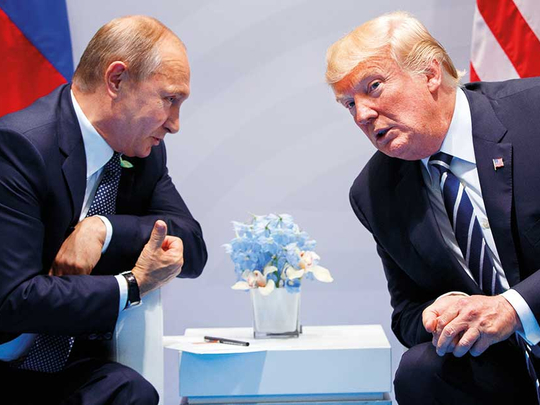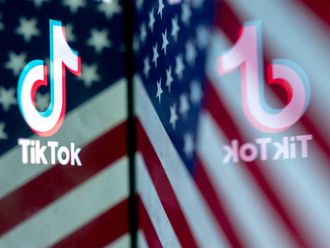
WASHINGTON: President Donald Trump on Tuesday called to congratulate President Vladimir Putin of Russia on his re-election, but did not raise with him the lopsided nature of his victory, Russia’s meddling in the 2016 presidential election or Moscow’s role in a nerve-agent attack on a former Russian spy and his daughter living in Britain.
Instead, Trump kept the focus of the call on what the White House said were “shared interests” — among them, North Korea and Ukraine — overruling his national security advisers, who had urged him to raise Russia’s recent behaviour.
“We had a very good call,” Trump told reporters in the Oval Office, where he had just welcomed Crown Prince Mohammad Bin Salman of Saudi Arabia. “We will probably be meeting in the not-too-distant future.”
The president’s upbeat characterisation came five days after his administration imposed sanctions on Russia for its interference in the election and for other “malicious cyberattacks,” the most significant action it has taken against Moscow since Trump took office. The United States also joined Britain, France and Germany in denouncing the Russian government for violating international law for the attack on the spy, Sergei V. Skripal, and his daughter Yulia.
Both actions highlighted a contradiction at the heart of the Trump presidency: the administration’s steadily tougher stance towards Russia and Trump’s own stubborn reluctance to criticise Putin.
Trump, a senior official said, signed off on the sanctions and the harsh language in the administration’s statements. But he was determined not to antagonise Putin, this person said, because he believes his leader-to-leader rapport is the only way to improve relations between the two countries.
That strategy has put Trump at odds with his own advisers: In preparing the president for the call, aides advised him to raise the nerve-agent attack and wrote on his briefing materials, “DO NOT CONGRATULATE.” The Washington Post first reported these details.
A second official, however, said that while Trump’s briefing cards did contain those suggestions, he spoke to his aides by phone and never saw the cards.
The White House also insisted that it was not the place of the United States to question how other countries conduct their elections — a contention that is at odds with years of critical statements about foreign elections by the United States, as well as recent statements by the Trump administration about elections in Venezuela and Iran.
“What we do know is that Putin has been elected in their country, and that’s not something we can dictate to them how they operate,” said the press secretary, Sarah Huckabee Sanders. “We can only focus on the freeness and fairness of our elections, something we 100 per cent fully support.”
Echoing the president, she went on to rail against the investigation of the special counsel, Robert Mueller, into links between the Trump campaign and Russia.
“To pretend like going through this absurd process for over a year would not bring frustration seems a little bit ridiculous,” she said.
Sanders noted that other foreign leaders, including Chancellor Angela Merkel, of Germany, had called Putin. Merkel’s office released a terse account of their call, saying she had told the Russian president, “Today, it is more important than ever to continue the dialogue with one another and to foster relations between our states and peoples.”
Republican lawmakers, even those who have resisted criticising Trump, faulted him for congratulating Putin.
“When I look at a Russian election, what I see is a lack of credibility in tallying the results,” said the Senate majority leader, Mitch McConnell of Kentucky. “Calling him wouldn’t have been high on my list.”
Senator John McCain of Arizona, the chairman of the Senate Armed Services Committee, was harsher.
“An American president does not lead the free world by congratulating dictators on winning sham elections,” he said in a statement. “And by doing so with Vladimir Putin, President Trump insulted every Russian citizen who was denied the right to vote in a free and fair election to determine their country’s future, including the countless Russian patriots who have risked so much to protest and resist Putin’s regime.”
In fact, both Presidents Barack Obama and George W. Bush called to congratulate Putin after previous election victories.
In Obama’s case, said Michael A. McFaul, who served as ambassador to Moscow during the Obama administration, there was lively internal debate about whether, and when, the president should make that call. Obama waited several days after Putin’s election in March 2012 before calling.
After that election, the State Department issued a statement in which it said, “The United States congratulates the Russian people on the completion of the presidential elections, and looks forward to working with the president-elect after the results are certified and he is sworn in.”
The language, McFaul said, was carefully chosen to applaud the Russian people for voting without praising Putin for winning. The statement also noted the reservations of outside observers about the “partisan use of government resources, and procedural irregularities on Election Day,” though it credited Russian authorities for reforms after a widely criticised parliamentary election the previous December.
The parliamentary election drew condemnation from Hillary Clinton, then the secretary of state, who said the Russian people, “like people everywhere, deserve the right to have their voices heard and their votes counted.” Her statement planted the seeds for the antipathy between her and Putin, who accused her of fomenting unrest in Russia.
This time, Putin prevailed with more than 76 per cent of the vote. International observers said Russian electoral authorities counted the votes efficiently, but several other factors prevented the contest from being fair.
“Restrictions on the fundamental freedoms of assembly, association and expression, as well as on candidate registration, have limited the space for political engagement and resulted in a lack of genuine competition,” observers from the Organisation for Security and Cooperation in Europe said in a report.












